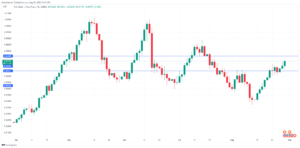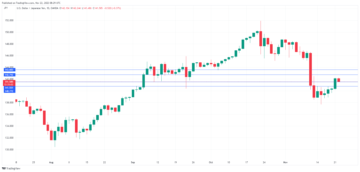Thursday is shaping up to be a frisky day for financial markets, but probably nothing today will be more important than when the bell tolls 6. A.M. in Berlin. The official Nord Stream 1 maintenance period finishes, and the natural gas from Russia is supposed to resume. President Putin has already signalled that flows will remain below capacity, and if they resume at 40%, the rate before the shutdown, that is probably the best Europe can expect. The European Union has already told member states that they will need to cut gas usage by 15% until March next year, and if flows are even lighter than 40%, the economic picture for Europe, and the UK, darken considerably.
European markets have piggybacked the bear market US equity rally this week. However, they ran into a brick wall yesterday as Euro-reality set in. Notably, EUR/USD failed ahead of 1.0300 and has fallen back to 1.0200. It isn’t just natural gas that is capping Eurozone risk; Italy’s government looks to be in imminent danger of collapsing after Mario Draghi won a non-confidence vote yesterday. It was a trojan horse, though, as the three largest members of the coalition boycotted the vote. Mr Draghi is expected to resign again, triggering new elections. It also imperils disbursement of further multi-billion tranches of the Covid-recovery fund and threatens Italy’s reform path, and by extension, will probably push BTP yields higher.
ECB poised for lift-off
I wouldn’t want to be the European Central Bank today, which is scheduled to announce its latest monetary policy decision this afternoon. It will be a damned if you do, damned if you don’t sort of meeting as they look across Europe’s wartime stagflationary economy and the ability of the Italians to shoot themselves in the foot so regularly since 1945. We can expect a token 0.25% hike to an inflation-slaying 0.25%, with the deposit rising to an equally frightening um, -0.25%. I have always said that something has been rotten in the state of Denmark with the EU since the GFC. While the rest of the world has many to squeeze in two or three economic cycles, Europe has basically sat at zero to negative interest rates since 2008 and has been quantitatively easing in some shape or form since then.
While the rate hike is a Hobson’s Choice for the ECB this afternoon, more attention is likely to be focused on the ECB’s anti-fragmentation tool to maintain government bond spreads between member states. Just don’t call it targeted quantitative easing, ok? With Rome pulling an Italian Job on the Eurozone at the worst possible time, it may be needed sooner rather than later. If markets are underwhelmed with the toolbox and Ms Lagarde’s press conference and rate outlook, European equities and the euro may also be underwhelmed, and that’s before we see whether Russian gas returns this morning.
The US equity rally continued overnight, thanks to the zero-sum game in the Netflix results and even large American airlines reporting profits; who would have thought? Tesla’s results were also ok, although they’ve taken a bath selling their bitcoin, but who hasn’t? Interestingly, Existing Home Sales slumped by -5.40% MoM for June as rate hikes bite. Equity markets ignored this as they are wont to do, but it speaks volumes that although US yields were nearly unchanged, the US dollar rallied quite impressively. And not just versus a running-on-empty euro either. Sterling was Trussed-up and beaten down, as was AUD and NZD etc, and Asian currencies also retreated. More on that below.
News that both Alphabet and Microsoft are “assessing hiring requirements” has sent US futures lower in Asia. All I can say as I watch diverging asset class prices is that one should beware of stock markets bearing “gifts.” I’ve been saying that for decades about investment banks, but it seems appropriate for the FOMO gnomes of Wall Street as well today.
In Asia today, the Asian Development Bank downgraded its Asia growth forecasts yet again while raising its inflation outlooks. We also have two central bank meetings of note. Firstly, the Bank of Japan announces its policy decision this morning. The BOJ is expected to temper its growth and inflation forecasts into 2023, and we can rightly assume there will be no change to its current ultra-easy settings. With US yields having settled down this week, the long USD/JPY trade has lost some momentum for now as well, likely easing some internal bureaucratic pressures.
Bank Indonesia is harder to call. BI has been a very reluctant rate hiker as its inflation environment remains benign, with a well-publicised priority to support Indonesia’s post-covid recovery. Unscheduled tightening last week by Singapore and Manila highlights the pressure central banks across the region are coming under as their currencies wilt under King Dollar. Notably, the rally by major currency heavyweights versus the greenback this past week did not flow meaningfully into the Asia FX space. In fact, looking at them this morning, all are at or near their recent lows, including USD/IDR, which continues nibbling at 15,000.00. That may force BI’s hand to enact a 0.25% hike, as with commodity prices falling, the help BI gets from a beefy current account surplus will diminish.
The Turkish central bank will also announce its latest policy decision this afternoon. That’s always worth buying some popcorn and taking a comfortable seat as we watch Erdogan-omics Part 10. More fun than a John Wick sequel and with a higher economic body count. Expect no change. South Africa also announces, and there I expect a far-more-sensible 0.50% hike to 5.25% to occur, with upside risk. That probably won’t be enough to relieve the pressure on the rand, and I expect this story to play out more in H2 across the EM and Asia FX space as the Fed keeps on hiking.
This article is for general information purposes only. It is not investment advice or a solution to buy or sell securities. Opinions are the authors; not necessarily that of OANDA Corporation or any of its affiliates, subsidiaries, officers or directors. Leveraged trading is high risk and not suitable for all. You could lose all of your deposited funds.
- Alphabet
- Asian Development Bank
- AUD/USD
- BI rate decision
- Bitcoin
- blockchain
- blockchain compliance
- blockchain conference
- BOJ policy decision
- Central Banks
- coinbase
- coingenius
- Consensus
- COVID-19
- crypto conference
- crypto mining
- cryptocurrency
- decentralized
- DeFi
- Digital Assets
- Earnings season
- ECB rate decision
- ethereum
- EUR/USD
- GBP/USD
- Italy Prime Minister Draghi
- machine learning
- MarketPulse
- Microsoft
- Newsfeed
- non fungible token
- Nord Stream 1 pipeline
- NZD/USD
- plato
- plato ai
- Plato Data Intelligence
- Platoblockchain
- PlatoData
- platogaming
- Polygon
- proof of stake
- South Africa central bank rate decision
- Turkish central bank rate decision
- US Dollar
- US Equities
- USD/IDR
- USD/JPY
- W3
- zephyrnet












